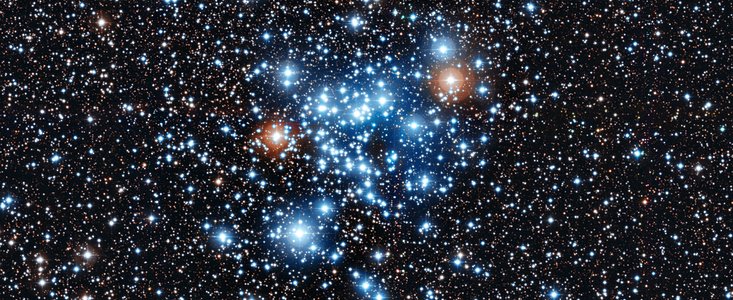Press Release
New Kind of Variable Star Discovered
Minute variations in brightness reveal whole new class of stars
12 June 2013
Astronomers using the Swiss 1.2-metre Euler telescope at ESO’s La Silla Observatory in Chile have found a new type of variable star. The discovery was based on the detection of very tiny changes in brightness of stars in a cluster. The observations revealed previously unknown properties of these stars that defy current theories and raise questions about the origin of the variations.
The Swiss are justly famed for their craftsmanship when creating extremely precise pieces of technology. Now a Swiss team from the Geneva Observatory has achieved extraordinary precision using a comparatively small 1.2-metre telescope for an observing programme stretching over many years. They have discovered a new class of variable stars by measuring minute variations in stellar brightness.
The new results are based on regular measurements of the brightness of more than three thousand stars in the open star cluster NGC 3766 [1] over a period of seven years. They reveal how 36 of the cluster’s stars followed an unexpected pattern — they had tiny regular variations in their brightness at the level of 0.1% of the stars’ normal brightness. These variations had periods between about two and 20 hours. The stars are somewhat hotter and brighter than the Sun, but otherwise apparently unremarkable. The new class of variable stars is yet to be given a name.
This level of precision in the measurements is twice as good as that achieved by comparable studies from other telescopes — and sufficient to reveal these tiny variations for the first time.
“We have reached this level of sensitivity thanks to the high quality of the observations, combined with a very careful analysis of the data,” says Nami Mowlavi, leader of the research team, “but also because we have carried out an extensive observation programme that lasted for seven years. It probably wouldn’t have been possible to get so much observing time on a bigger telescope.”
Many stars are known as variable or pulsating stars, because their apparent brightness changes over time. How the brightness of these stars changes depends in complex ways on the properties of their interiors. This phenomenon has allowed the development of a whole branch of astrophysics called asteroseismology, where astronomers can “listen” to these stellar vibrations, in order to probe the physical properties of the stars and get to know more about their inner workings.
“The very existence of this new class of variable stars is a challenge to astrophysicists,” says Sophie Saesen, another team member. “Current theoretical models predict that their light is not supposed to vary periodically at all, so our current efforts are focused on finding out more about the behaviour of this strange new type of star.”
Although the cause of the variability remains unknown, there is a tantalising clue: some of the stars seem to be fast rotators. They spin at speeds that are more than half of their critical velocity, which is the threshold where stars become unstable and throw off material into space.
“In those conditions, the fast spin will have an important impact on their internal properties, but we are not able yet to adequately model their light variations,” explains Mowlavi. “We hope our discovery will encourage specialists to address the issue in the hope of understanding the origin of these mysterious variations.”
Notes
[1] This star cluster is one of several included in this major monitoring programme. NGC 3766 lies about 7000 light-years from Earth in the southern constellation of Centaurus (The Centaur) and is estimated to be about 20 million years old.
More information
This research was presented in a paper “Stellar variability in open clusters I. A new class of variable stars in NGC 3766”, by N. Mowlavi et al., published in the journal Astronomy & Astrophysics on 12 June 2013.
The team is composed of N. Mowlavi, F. Barblan, S. Saesen and L. Eyer. All four authors are from the Geneva Observatory in Switzerland.
ESO is the foremost intergovernmental astronomy organisation in Europe and the world’s most productive ground-based astronomical observatory by far. It is supported by 15 countries: Austria, Belgium, Brazil, Czechia, Denmark, France, Finland, Germany, Italy, the Netherlands, Portugal, Spain, Sweden, Switzerland and the United Kingdom. ESO carries out an ambitious programme focused on the design, construction and operation of powerful ground-based observing facilities enabling astronomers to make important scientific discoveries. ESO also plays a leading role in promoting and organising cooperation in astronomical research. ESO operates three unique world-class observing sites in Chile: La Silla, Paranal and Chajnantor. At Paranal, ESO operates the Very Large Telescope, the world’s most advanced visible-light astronomical observatory and two survey telescopes. VISTA works in the infrared and is the world’s largest survey telescope and the VLT Survey Telescope is the largest telescope designed to exclusively survey the skies in visible light. ESO is the European partner of a revolutionary astronomical telescope ALMA, the largest astronomical project in existence. ESO is currently planning the 39-metre European Extremely Large optical/near-infrared Telescope, the E-ELT, which will become “the world’s biggest eye on the sky”.
Links
Contacts
Nami Mowlavi
Geneva Observatory, University of Geneva/ISDC
Switzerland
Tel: +41 22 37 92 194
Email: Nami.Mowlavi@unige.ch
Sophie Saesen
Geneva Observatory, University of Geneva
Switzerland
Tel: +41 22 379 24 46
Email: Sophie.Saesen@unige.ch
Richard Hook
ESO Public Information Officer
Garching bei München, Germany
Tel: +49 89 3200 6655
Cell: +49 151 1537 3591
Email: rhook@eso.org
About the Release
| Release No.: | eso1326 |
| Name: | NGC 3766 |
| Type: | Milky Way : Star : Grouping : Cluster : Open |
| Facility: | Swiss 1.2-metre Leonhard Euler Telescope |
Our use of Cookies
We use cookies that are essential for accessing our websites and using our services. We also use cookies to analyse, measure and improve our websites’ performance, to enable content sharing via social media and to display media content hosted on third-party platforms.
ESO Cookies Policy
The European Organisation for Astronomical Research in the Southern Hemisphere (ESO) is the pre-eminent intergovernmental science and technology organisation in astronomy. It carries out an ambitious programme focused on the design, construction and operation of powerful ground-based observing facilities for astronomy.
This Cookies Policy is intended to provide clarity by outlining the cookies used on the ESO public websites, their functions, the options you have for controlling them, and the ways you can contact us for additional details.
What are cookies?
Cookies are small pieces of data stored on your device by websites you visit. They serve various purposes, such as remembering login credentials and preferences and enhance your browsing experience.
Categories of cookies we use
Essential cookies (always active): These cookies are strictly necessary for the proper functioning of our website. Without these cookies, the website cannot operate correctly, and certain services, such as logging in or accessing secure areas, may not be available; because they are essential for the website’s operation, they cannot be disabled.
Functional Cookies: These cookies enhance your browsing experience by enabling additional features and personalization, such as remembering your preferences and settings. While not strictly necessary for the website to function, they improve usability and convenience; these cookies are only placed if you provide your consent.
Analytics cookies: These cookies collect information about how visitors interact with our website, such as which pages are visited most often and how users navigate the site. This data helps us improve website performance, optimize content, and enhance the user experience; these cookies are only placed if you provide your consent. We use the following analytics cookies.
Matomo Cookies:
This website uses Matomo (formerly Piwik), an open source software which enables the statistical analysis of website visits. Matomo uses cookies (text files) which are saved on your computer and which allow us to analyze how you use our website. The website user information generated by the cookies will only be saved on the servers of our IT Department. We use this information to analyze www.eso.org visits and to prepare reports on website activities. These data will not be disclosed to third parties.
On behalf of ESO, Matomo will use this information for the purpose of evaluating your use of the website, compiling reports on website activity and providing other services relating to website activity and internet usage.
Matomo cookies settings:
Additional Third-party cookies on ESO websites: some of our pages display content from external providers, e.g. YouTube.
Such third-party services are outside of ESO control and may, at any time, change their terms of service, use of cookies, etc.
YouTube: Some videos on the ESO website are embedded from ESO’s official YouTube channel. We have enabled YouTube’s privacy-enhanced mode, meaning that no cookies are set unless the user actively clicks on the video to play it. Additionally, in this mode, YouTube does not store any personally identifiable cookie data for embedded video playbacks. For more details, please refer to YouTube’s embedding videos information page.
Cookies can also be classified based on the following elements.
Regarding the domain, there are:
- First-party cookies, set by the website you are currently visiting. They are stored by the same domain that you are browsing and are used to enhance your experience on that site;
- Third-party cookies, set by a domain other than the one you are currently visiting.
As for their duration, cookies can be:
- Browser-session cookies, which are deleted when the user closes the browser;
- Stored cookies, which stay on the user's device for a predetermined period of time.
How to manage cookies
Cookie settings: You can modify your cookie choices for the ESO webpages at any time by clicking on the link Cookie settings at the bottom of any page.
In your browser: If you wish to delete cookies or instruct your browser to delete or block cookies by default, please visit the help pages of your browser:
Please be aware that if you delete or decline cookies, certain functionalities of our website may be not be available and your browsing experience may be affected.
You can set most browsers to prevent any cookies being placed on your device, but you may then have to manually adjust some preferences every time you visit a site/page. And some services and functionalities may not work properly at all (e.g. profile logging-in, shop check out).
Updates to the ESO Cookies Policy
The ESO Cookies Policy may be subject to future updates, which will be made available on this page.
Additional information
For any queries related to cookies, please contact: pdprATesoDOTorg.
As ESO public webpages are managed by our Department of Communication, your questions will be dealt with the support of the said Department.






